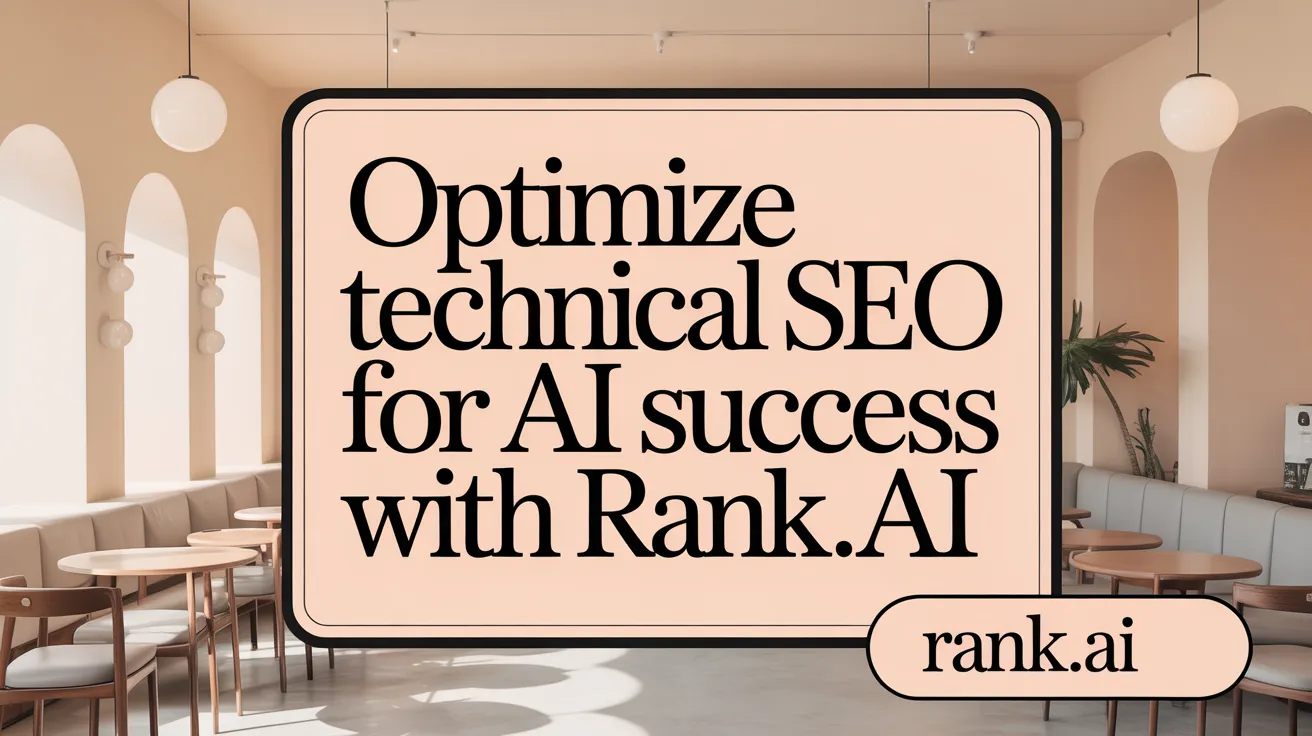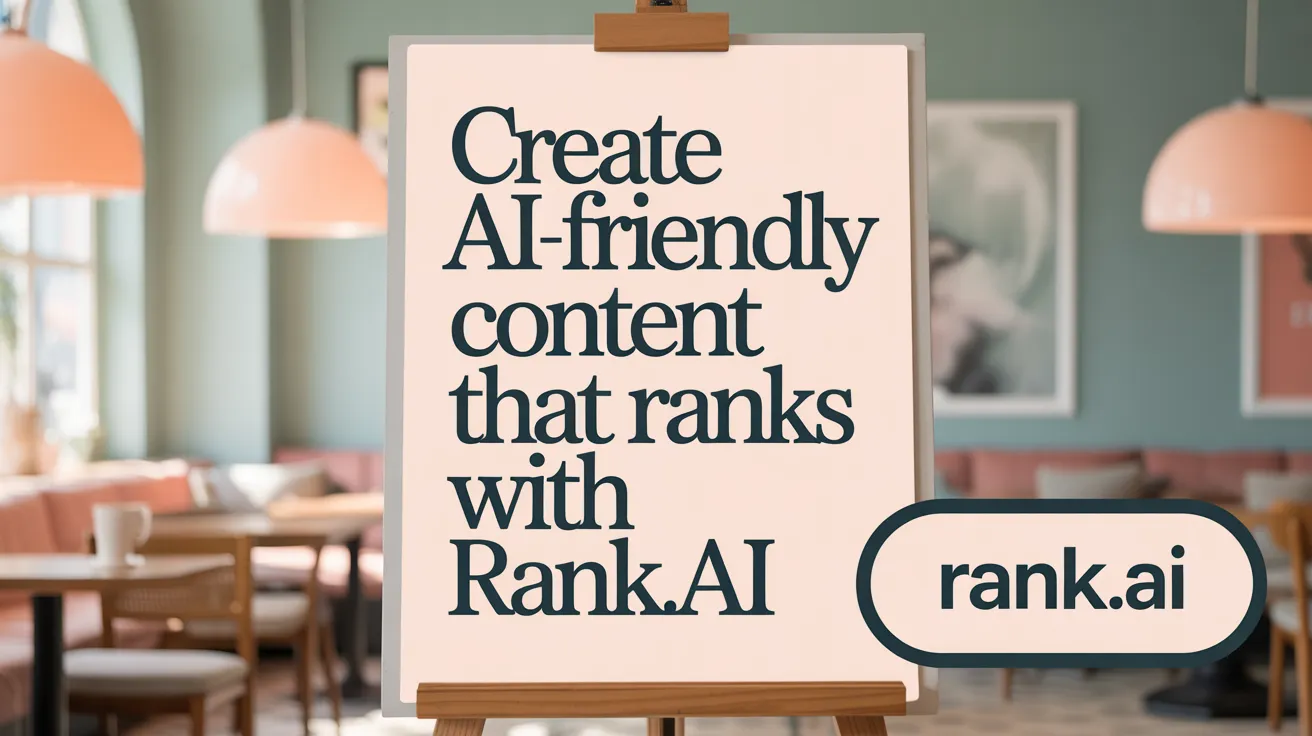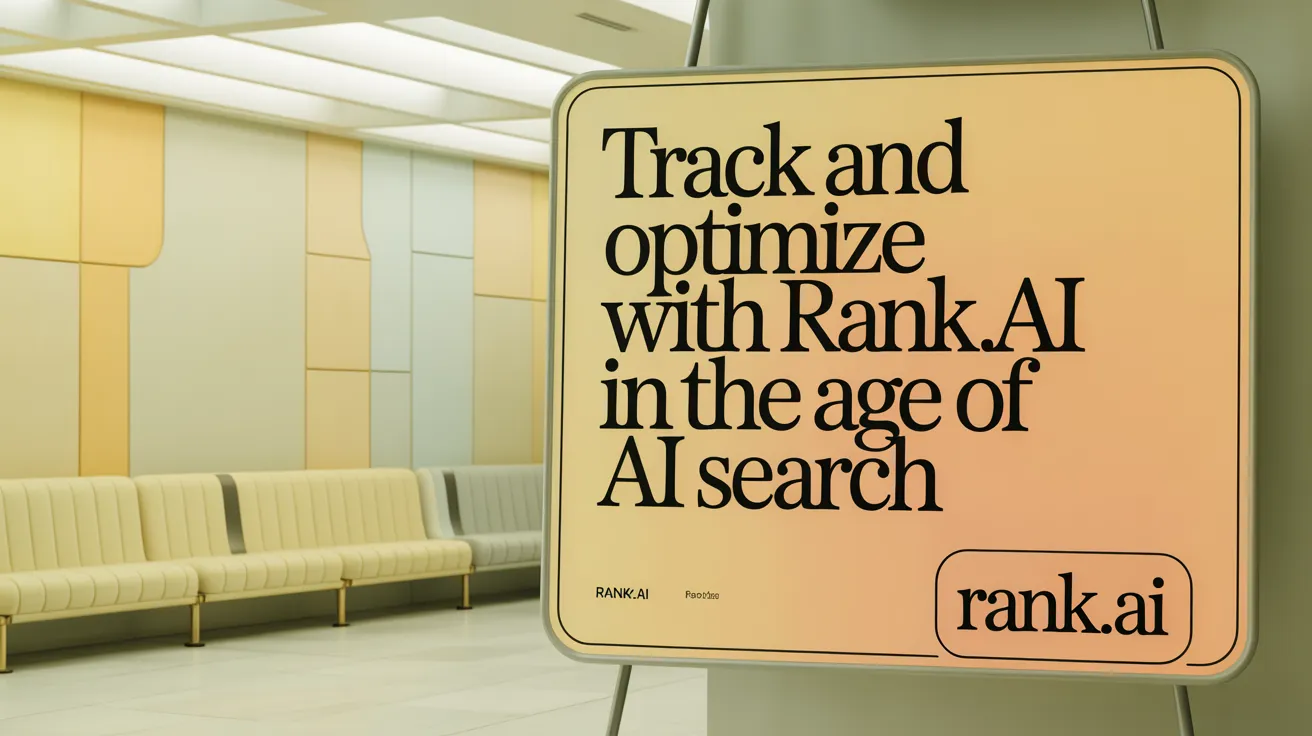Implementing AI-Driven SEO Strategies for Enhanced Search Rankings
Harnessing AI for Next-Level SEO Success

Transforming Search Rankings through AI-Driven SEO
In the rapidly evolving landscape of digital marketing, artificial intelligence (AI) is revolutionizing search engine optimization (SEO). Businesses aiming for top-tier online visibility must adapt by integrating AI-powered strategies with traditional SEO practices. This article explores how AI is reshaping SEO, the role of platforms like Rank.ai, and practical methods for implementing AI-driven approaches to enhance search rankings effectively.
Understanding Rank.ai: An AI-Powered SEO Platform
What is Rank.ai and what services does it provide?
Rank.ai is an innovative AI-powered SEO platform designed to enhance online visibility and improve search rankings by leveraging AI technologies. It combines traditional SEO methods with advanced AI capabilities to adapt to the rapidly evolving AI-driven search landscape.
The platform offers comprehensive features to help businesses optimize their SEO strategies, including:
- Tracking brand presence and appearances in AI search engines such as ChatGPT, Google AI, and others.
- Analyzing brand mentions and content performance across AI-driven search platforms.
- Automating workflows like keyword research, content optimization, and ranking monitoring.
- Integrating data from popular SEO tools for advanced analytics and reporting.
Rank.ai serves as a crucial tool for companies looking to optimize content specifically for AI understanding and to maintain competitive advantages in AI-powered search results. By focusing on aspects like structured data, content relevance, and AI-compliant optimization, it enables more precise targeting and improved rankings.
Services provided by Rank.ai
Rank.ai's suite of services includes:
- AI SEO Analytics: Monitors website visibility and engagement within AI search environments.
- Content Optimization: Suggests improvements for content structure, metadata, and keywords tailored for AI algorithms.
- Keyword and Competitor Analysis: Identifies high-value keywords and analyzes competitor strategies under AI-focused parameters.
- Performance Tracking: Provides detailed reports on SEO effectiveness, including AI snippet appearances and user engagement metrics.
Target users and industries served
Rank.ai caters to businesses and digital marketing teams across various industries seeking to harness AI for SEO. Its flexibility makes it suitable for small to large enterprises, SEO agencies, and content creators aiming to:
- Stay ahead in AI-driven search rankings.
- Improve brand visibility on emerging AI platforms.
- Optimize content workflows with AI automation.
Overall, Rank.ai empowers users to adapt quickly to AI search trends, offering a strategic advantage in today's competitive digital marketing environment.
Integrating AI with Traditional SEO Methods through Rank.ai
How does Rank.ai integrate AI technology with traditional SEO methods?
Rank.ai effectively blends AI technology with traditional SEO strategies to create a powerful and comprehensive SEO approach. It harnesses advanced AI-powered SEO tools to enhance content creation and optimization, improving keyword research by analyzing large datasets and understanding user intent. This ensures that SEO efforts are more precisely targeted and aligned with real search behaviors.
By combining AI-generated content with established SEO techniques—such as structured formatting, keyword optimization, and backlink building—Rank.ai helps improve website visibility across multiple search engines. The platform's AI capabilities include predictive analytics and trend forecasting, enabling marketers to anticipate changes in search trends and adapt their strategies proactively.
Rank.ai also utilizes AI-powered features like content personalization, schema markup, and featured snippet optimization, which boost search performance by aligning content with evolving search engine algorithms. This integration allows businesses to maintain competitiveness through efficient automation and data-driven decision-making while still emphasizing the importance of high-quality, authoritative content.
The synergy between AI insights and proven SEO practices ensures that Rank.ai users can optimize for both current visibility and future search innovations, including voice search and visual search. This combination enhances overall SEO effectiveness by leveraging the strengths of both AI technology and traditional methods.
Who Benefits from Rank.ai’s AI-Driven SEO Solutions?

What types of businesses can benefit from Rank.ai's services?
Rank.ai caters to businesses of all sizes and industries, making its AI-powered SEO platform and digital marketing solutions versatile and widely applicable.
Small startups gain a cost-effective way to compete in competitive digital markets, while large enterprises use Rank.ai to optimize marketing strategies and enhance customer engagement. E-commerce platforms, service providers, content creators, and technology companies especially benefit from its AI-driven SEO and marketing automation.
Industry applicability
Rank.ai serves a broad range of sectors by combining traditional SEO methods with advanced AI technology. This flexibility allows professionals in retail, technology, media, and service industries to improve online visibility and search rankings effectively. Innovation-driven organizations and those prioritizing digital transformation find Rank.ai valuable for maintaining competitiveness amid evolving search algorithms.
Scalability and customization for various enterprises
Rank.ai’s platform scales smoothly to accommodate businesses from small ventures to large corporations. Its AI capabilities are customizable to meet specific needs, including targeted keyword research, content optimization, and backlink analysis. This adaptability empowers enterprises to tailor SEO efforts based on their market size, budget, and unique goals, ensuring efficient resource use and measurable results.
In summary, Rank.ai's AI-driven SEO tools offer flexible, scalable solutions designed to enhance search performance for a diverse client base, from startups to multinational companies, across various industries.
Optimizing Across Diverse Search Engines with AI
Traditional Search Engines and AI Search Platforms
The landscape of search engines has expanded beyond traditional platforms like Google and Bing to include advanced AI-powered environments such as ChatGPT, Perplexity, and Google’s Search Generative Experience (SGE). These AI platforms utilize machine learning in SEO and natural language processing in SEO to provide more personalized, intent-driven, and conversational search experiences. As AI-driven search grows, it blends traditional web results with AI-generated answers, changing the way search rankings are determined and how users interact with search results.
Adapting SEO for AI Environments
Optimizing for these evolving search experiences requires a shift in SEO strategies. Marketers must focus on creating unique and valuable content for AI success that aligns with AI understanding. This includes emphasizing natural language queries, semantic relevance, expert authority, and implementing structured data such as schema markup to enhance crawlability and AI comprehension. Technical SEO elements like site speed and mobile-friendliness remain vital due to their impact on user experience and AI rankings. Additionally, monitoring and adapting to emerging AI search features through continuous data analysis and content optimization ensures competitiveness in these environments.
Rank.ai’s Multi-Engine Optimization Approach
Rank.ai exemplifies a leading-edge approach by integrating AI technology with traditional SEO methods to optimize for a broad array of search engines. It specifically targets established platforms like Google as well as growing AI-based search engines including ChatGPT, Perplexity, and Google’s Search Generative Experience (SGE). Rank.ai leverages AI-powered SEO tools that enhance AI-enhanced keyword research, content structuring with AI, AI in link building, and technical SEO with AI across these diverse channels. Its focus on Answer Engine Optimization (AEO) helps businesses achieve high visibility in AI-driven search results. Moreover, Rank.ai provides cross-platform brand presence tracking and advanced analytics to maintain and improve search prominence as AI search evolves.
Automated Content Creation: How AI Powers Scale and Quality
Role of AI in Content Generation
AI-driven platforms like Rank.ai SEO Platform utilize advanced technologies such as natural language processing in SEO and machine learning for SEO to automate the creation of digital content. This includes developing blog posts, website copy, and multimedia resources that are optimized for search engines. By analyzing large datasets of keywords, SEO trends, and user behavior, AI crafts relevant and engaging materials rapidly, enabling businesses to scale their content production while enhancing online visibility and organic reach.
Human Oversight Importance
Despite the capabilities of AI in generating content, human involvement remains essential. Editors and marketers review AI-produced materials to ensure factual accuracy, maintain brand voice and tone, and elevate content quality. This collaboration prevents potential errors or biases in AI output and ensures the content aligns with strategic goals and ethical standards.
Integration of Keyword and SEO Strategies
Automated content creation platforms incorporate sophisticated keyword research automation, and SEO techniques within their workflows. Rank.ai and similar tools analyze search intent, competitive landscapes, to identify high-impact keywords. They optimize content structure, metadata, and semantic relevance to boost search rankings. Continuous performance tracking allows AI systems to refine content effectiveness, adapt to evolving algorithms, and support targeted marketing efforts.
Together, these AI-powered SEO tools approaches facilitate efficient, scalable, and SEO-focused content creation that drives better engagement and business growth.
AI-Enhanced Keyword Research and Trend Prediction

How Does AI Improve Keyword Targeting?
AI revolutionizes keyword targeting by analyzing vast datasets quickly and accurately. Unlike traditional keyword research that relies on basic metrics, AI-driven SEO tools examine user intent, semantic relevance, and competitor strategies. This deep analysis helps uncover high-value keywords that align with what users are truly searching for, ensuring better visibility and engagement.
What Role Does AI Play in Identifying Long-Tail and Niche Opportunities?
Machine learning in SEO excels at pinpointing long-tail keywords and niche markets by recognizing less competitive phrases with high conversion potential. Machine learning algorithms detect patterns in search data and user behavior, revealing untapped keyword clusters and niche topics. This empowers marketers to optimize content for highly specific queries, enhancing their reach in specialized areas and driving more qualified traffic.
How Does Predictive Analytics Shape SEO Strategies?
Predictive analytics powered by AI forecasts emerging search trends and algorithm changes. By interpreting historical and real-time data, AI tools can anticipate shifts in user interests and search engine behaviors. This foresight enables marketers to adapt their SEO strategies proactively, optimizing content before competition intensifies, thus maintaining or improving search rankings.
| Aspect | AI Capabilities | Benefits |
|---|---|---|
| Keyword Targeting | Analyzes intent, competition, and semantics | Targets relevant, high-value keywords accurately |
| Long-Tail & Niche Keywords | Detects underused keywords and niche search patterns | Expands reach with less competitive keywords |
| Predictive SEO Analytics | Forecasts trends and algorithm updates | Enables proactive optimization and strategy shifts |
Leveraging AI in keyword research and predictive analytics offers businesses a powerful edge in crafting effective, data-driven SEO strategies that anticipate user needs and market movements.
Technical SEO in the Era of AI: Structured Data and Site Performance

Why Is Structured Data and Schema Markup Vital for AI SEO?
Structured data and schema markup help search engines, including AI-powered ones like Google’s Search Generative Experience (SGE), understand your site's content accurately. Using these tools increases the chance of your pages appearing in AI-enhanced search features such as rich snippets and AI summaries. Proper implementation ensures that AI systems correctly interpret and present your content in search results, improving visibility and click-through rates, as outlined in the Google Search Central SEO guide and detailed in Google’s AI Overviews and SEO impact.
How Do Mobile Optimization and Site Speed Influence SEO Today?
Mobile optimization and site speed remain critical factors for SEO performance. AI-driven search engines prioritize websites that provide a seamless mobile experience and fast loading times. These technical elements improve user engagement, reduce bounce rates, and contribute positively to rankings. Tools empowered by AI help identify opportunities to enhance responsiveness and optimize page speed effectively, as discussed in ResearchFDI's AI integration and Google’s latest SEO guidance on creating great page experiences.
Can AI Automate Site Audits and Fix SEO Issues?
Yes, AI tools automate technical SEO audits by swiftly identifying problems such as broken links, duplicate content, slow load times, and indexing errors. Platforms like Alli Ali and Indexly offer features that not only detect issues but also assist in bulk editing, instant indexing, and automatic optimization. These capabilities allow website owners to maintain high technical standards, ensuring better crawlability and consistent SEO health without exhaustive manual effort, supported by AI-powered SEO strategies and Google Search Central SEO tools.
Content Optimization Strategies Tailored for AI Search

Using AI to enhance content structure and readability
AI-powered SEO tools, such as Frase, ChatGPT in SEO, and BrightEdge Content Advisor, analyze large datasets to help optimize your content's structure and readability effectively. They suggest improvements like clear headings, bullet points, and concise answers that align well with AI algorithms' preferences. These tools improve keyword placement naturally while ensuring content is engaging and accessible, boosting its chances to rank higher in AI-driven search results.
Incorporating E-E-A-T principles
Google prioritizes content that demonstrates Experience, Expertise, Authoritativeness, and Trustworthiness (E-E-A-T). To meet these standards, content should be original, factually accurate, and show clear author credentials when possible. AI can assist in maintaining these standards by guiding content creation toward reliable and expert sources and helping structure information to convey credibility effectively, as outlined in the Google Search Central SEO guide and AI-Generated Content Overview. Additional insights on E-E-A-T for AI content success can be found in Succeeding in AI Search.
Optimizing for featured snippets and AI-generated answers
Featured snippets and AI-generated answers have become vital in search as AI summarization shifts user behavior towards zero-click searches. Structuring content to include succinct answers, bullet lists, and clear definitions can increase the chances of being selected for these features. Employing schema markup and structured data further aids AI systems in accurately interpreting and displaying your page content in these rich results, as described in SEO for AI search and Google AI Overview. For deeper technical SEO strategies in AI search, see technical SEO for AI.
Leveraging AI for Link Building and Authority Growth
How does AI help identify reputable backlink opportunities?
AI analyzes large volumes of data to find websites with high authority and relevance for backlinking. It uses machine learning in SEO algorithms to evaluate a site's domain authority, trustworthiness, and topical fit. By automatically scanning competitor link profiles and industry-related sites, AI-powered SEO tools pinpoint valuable backlink prospects more efficiently than manual research.
Can AI analyze competitor linking strategies?
Yes, AI-powered SEO platforms track and analyze competitor backlinks to reveal their link-building tactics. These tools assess where competitors earn links, anchor text usage, and link quality. Understanding these patterns helps create a smarter, targeted link acquisition strategy aimed at gaining similar or higher-quality backlinks to boost search rankings.
How does AI optimize internal linking?
AI provides insights into the website's structure by analyzing content relationships and user behavior. It recommends strategic internal links to improve crawlability and distribute page authority effectively. AI can suggest where to place anchor texts, highlight orphaned pages, and help maintain a logical content hierarchy, enhancing both user experience and SEO value.
By integrating AI in link building, businesses can efficiently source authoritative backlinks, uncover competitor tactics, and enhance internal linking structure. This data-driven approach strengthens website authority and supports sustainable SEO growth.
Measuring Performance in AI-Driven SEO Environments

Tracking AI Snippet Click-Through Rates
Click-through rates (CTR) for AI-generated snippets provide a direct measure of how often users engage with your content when it appears as a summarized result in AI-powered search engines like Google’s Search Generative Experience (SGE). Monitoring these metrics helps marketers understand the visibility and impact of featured AI snippets, which often result in zero-click scenarios but indicate user interest. Tools like Google Search Central SEO guide and AI-specific SEO platforms can track snippet appearances and CTR, allowing timely optimization to improve engagement.
Monitoring Brand Visibility Across AI Search
AI search platforms integrate web content with generative answers, influencing brand presence in search results. Monitoring brand visibility in AI environments involves tracking how frequently your site or content is cited or summarized by AI tools such as ChatGPT, Perplexity, and Gemini. Brand visibility analytics help assess your digital footprint within conversational search results and AI overviews, enabling strategic adjustments to enhance citation likelihood. AI-powered SEO tools can consolidate this visibility data across multiple AI search channels for comprehensive insights.
Using AI SEO Analytics Tools for Reporting
Specialized AI SEO analytics tools like Semrush AI Toolkit, SE Ranking, and Rank.ai provide rich data sets to analyze SEO performance in AI-driven search contexts. These platforms offer features including real-time tracking of keyword rankings, AI snippet impressions, backlink analysis, and content performance metrics tailored for AI search ecosystems. Continuous monitoring through these tools supports adaptive SEO strategies by detecting shifts in AI algorithm updates and user behavior trends, ensuring your SEO efforts remain effective and data-driven.
Upcoming Trends: Voice Search, Visual Search, and Ethical AI Use
How is SEO adapting for voice-activated queries?
Optimizing for voice search is a growing trend in SEO, fueled by the rise of smart speakers and voice assistants. AI analyzes conversational language to help marketers target long-tail keywords and natural, question-based queries. This shift encourages content creation that mirrors spoken dialogue, supporting clarity, relevance, and context. Tools like Frase assist in crafting voice-friendly content with a conversational tone, improving chances to appear in voice search results. For more on AI-driven voice search optimization, see AI-powered SEO tools.
What role does AI play in enhancing visual and video SEO?
Visual and video content optimization is critical in AI-driven SEO strategies. AI-powered tools suggest relevant alt text and image tags, improving crawlability and image discoverability. Enhancing metadata, video descriptions, and thumbnails also boosts engagement. With the advent of visual search technologies—including image recognition and AI-based video analysis—SEO efforts increasingly focus on multimodal content. Providing high-quality images and videos supports better indexing and user experience. Learn more about optimizing images and videos for search and supporting multimodal content with images and videos.
Why is ethical AI use important in SEO?
As AI integrates deeply into SEO, maintaining transparency and ethical standards is vital. Ethical AI implementation involves clear communication of data use, avoiding manipulation tactics, and ensuring content quality and authenticity. Google emphasizes user-focused content that demonstrates trustworthiness and expertise, aligning with E-E-A-T principles. SEO professionals balance automated AI content generation with human oversight to prevent misinformation and uphold compliance with policies. Ethical SEO fosters long-term trust, user satisfaction, and sustainable search rankings. Guidance on ethical AI use in SEO helps ensure responsible implementation.
Embracing AI for Sustainable SEO Growth
As AI technologies continue to evolve and reshape search engines, integrating AI-driven strategies with traditional SEO practices is essential for businesses striving to maintain and enhance their online visibility. Platforms like Rank.ai exemplify how comprehensive AI-powered tools can automate content creation, optimize for diverse search environments, and provide predictive insights that anticipate market shifts. By adopting these innovations—focusing on quality content, technical excellence, and user-centric optimization—organizations can position themselves for long-term success in the dynamic digital landscape. Ultimately, leveraging AI in SEO is not just about keeping pace but about gaining a strategic advantage in the future of search.
Table of contents
Recent articles
Fresh insights on AI and SEO to help you stay ahead of the curve.


Ready to Improve
Your Rankings?
Use our free tools to get instant insights into your SEO performance and discover opportunities to rank higher




